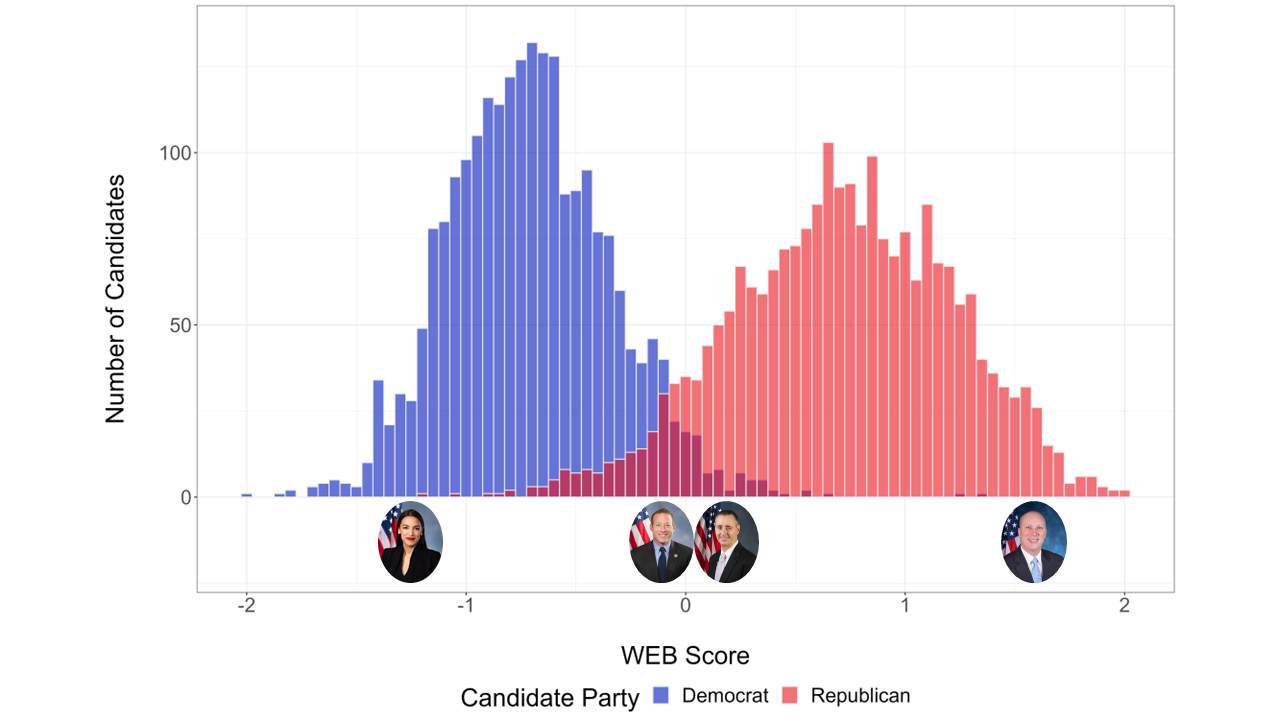.png)
Every election cycle, members of Congress running for re-election in states with party primaries must first gain their party’s nomination before appearing on the general election ballot. To do so, these incumbents must appeal to a smaller electorate of primary voters and beat out candidates running under the same party label.
While primary election competition has been increasing over the last few decades, incumbents still face very low levels of competition in these primary races. They often face candidates who lack political experience or don’t fundraise, thereby lacking the resources to mount a serious challenge. While high-profile challenger victories over incumbents do occur, such as Alexandria Ocasio-Cortez's victory over Rep. Joe Crowley in 2018, they are quite rare. In 2024, only four incumbents lost their primary elections.
Despite incumbents' high degree of success in primaries, they are still fearful of losing to a primary challenger. Interviews conducted with current and former members of Congress highlight this dynamic, particularly when it comes to incumbents’ position-taking. My research addresses whether incumbents adopt more extreme issue positions during the campaign in response to an extreme primary challenger.
What I found is that incumbents' fear of losing in the primary does, in fact, change their behavior during the campaign. In a newly published paper, I find that incumbents running against an extreme primary challenger adopt more extreme issue positions during the campaign than they would if facing no challenger or a more moderate primary challenger.
While interviews suggest incumbents change their campaign positioning in response to an extreme primary challenger, this is difficult to measure and analyze systematically. In the paper, I develop a novel measurement of campaign issue positioning: Website Embedding Strategic Positioning Scores, or WEB Scores for short. WEB Scores use a machine learning algorithm trained on candidates’ issue positions from a newly released dataset on congressional candidates, CampaignView. This dataset contains detailed policy platforms from over 4,500 candidates who ran for Congress between 2018 and 2022, as presented on their campaign websites.
WEB Scores capture what one would expect from a measure of campaign positioning. Candidates who run on more left-leaning policies, such as Rep. Alexandria Ocasio-Cortez, have WEB Scores well to the left of the median Democratic candidate. Meanwhile, candidates who run on more right-leaning policies, such as Rep. Chip Roy, have WEB Scores well to the right of the median Republican candidate. Some more moderate candidates, such as Rep. Brian Fitzpatrick and Rep. Josh Gottheimer, both co-chairs of the Bipartisan Problem Solvers Caucus, have WEB Scores that are more moderate than the median candidate of their respective party.

WEB Scores offer two important advantages over previous measures of campaign position. First, they are based on the actual behavior I am interested in measuring: the positions candidates run on during their campaign. Second, they provide better coverage of congressional candidates, enabling researchers to address a wide range of new questions related to campaign positioning and primary elections. Both are important features of a measure of campaign positioning, especially one used to analyze how incumbents’ positioning changes in response to the emergence of an extreme primary challenger.
Using this new measure of campaign positioning, I analyze the extent to which facing an extreme, moderate, or no primary challenger affects the campaign positioning of incumbents. When looking at how the same incumbents change their positioning from 2018 to 2020, I find that incumbents facing an extreme primary challenger adopt more extreme positions, relative to if they faced a moderate primary challenger or no primary challenger, and incumbents facing a moderate primary challenger adopt more moderate positions, relative to if they faced an extreme primary challenger or no primary challenger. This effect persists even after controlling for a host of important factors, including those related to the district and the incumbent themselves.
It is important to note that the magnitude of these effects is substantively meaningful. For example, facing an extreme primary challenger is associated with an incumbent becoming about 0.24 points more extreme compared to facing a moderate primary challenger. In other words, that’s about the same ideological gap you’d find between a centrist Republican in the Main Street Partnership and a more conservative member of the Republican Study Committee (0.26).
Who emerges to challenge incumbents in primary elections is a powerful driver of how candidates position themselves on the issues. Even if primary challengers do not win elections, they influence the positions candidates take when running for re-election. When more extreme challengers run, incumbents tend to move toward the extremes; conversely, when more moderate challengers run, they can pull incumbents closer to the center.
We know that campaign behavior often translates into future legislative behavior. The promises candidates make, and the issues they emphasize on the trail, tend to shape their priorities in office. This fact highlights the potential influence of primary election challengers on congressional issue polarization. Future work, however, should continue to explore how the positioning of primary challengers affects the legislative behavior of incumbents.
For interested researchers, journalists, activists, and the general public, the full dataset of WEB Scores is publicly available to explore and use here.
—
Colin R. Case is an Assistant Professor in the Department of Political Science and a Researcher Affiliate with the Center for Social Science Innovation at the University of Iowa.His primary research agenda focuses on the strategic behavior of congressional candidates and members of Congress with a methodological focus on measurement and text as data. His research has been published in outlets such as Journal of Politics, Political Science Research and Methods, and Political Behavior.

Stay up-to-date on the latest news and resources from Unite America.